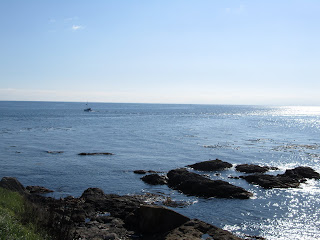





A review of
The Closing of the Muslim Mind appears in the American Spectator today under the title,
Faith Without Reason. Sounds interesting but nowhere near as profound as comments made by Pope Benedict on the same subject in his
Regensburg Lecture of 2006.
Thinking of Islam as a faith without reason is not entirely true. Reasoning is allowed in Islam, but only on the meaning of the words in the Koran, not on whether the words themselves are reasonable or factual.
To illustrate his message the Pope cited a conversation between a Byzantine Emperor and an educated Persian. In Byzantine Christianity, by the way, the Emperor was also the head of the Church. Here is the money quote:
The decisive statement in this argument against violent conversion is this: not to act in accordance with reason is contrary to God's nature.[5] The editor, Theodore Khoury, observes: For the emperor, as a Byzantine shaped by Greek philosophy, this statement is self-evident. But for Muslim teaching, God is absolutely transcendent. His will is not bound up with any of our categories, even that of rationality.[6] Here Khoury quotes a work of the noted French Islamist R. Arnaldez, who points out that Ibn Hazm went so far as to state that God is not bound even by his own word, and that nothing would oblige him to reveal the truth to us. Were it God's will, we would even have to practise idolatry.
Just to show how wrong the Pope was about Islam's lack of respect for reason, thousands of Muslims rioted in cities all over the world.
Christian thinkers have had an ongoing discussion of the relationship of faith and reason- especially during medieval times-and it continues today in our modern secular culture which seems to believe in reason without faith. That supposition is an article of faith in itself. The secular society is still deeply embedded in Christian Civilization whether its advocates realize it or not. I think mostly not, since they have received their education in universities where religion is villified. Thus they are largely ignorant of the great Christian intellectual heritage which has looked deeply into the problem and of the simple fact that it was the Christian belief in the ultimate reasonableness of God that opened up a space where secularism could flourish.
The Regensburg lecture was given over four years ago, so why am I bringing it up now? Well, there's a big election coming up next week in the US and it appears a massive sea change in American public life is going to occur. For many years now a massive fissure has been opening up between the people who produce wealth, otherwise known as the private sector, and the political class, also known as the public sector. The people who produce wealth would be farmers, engineers, manufacturers, business people, tradesmen as well as the administrators who keep things organized and the investors who allocate funds. The political class exists to facilitate all this activity, to enact and enforce a common set of rules, and to protect the whole community.
For many years now the proportion of the economy going to support the public sector has been growing. At the same time many of the services it is supposed to provide have been deteriorating. The members of the private sector are largely apolitical. They are too busy minding their own business to worry too much about what anybody else is doing. But it has become increasingly obvious that the political class, which has now captured virtually every organ of public communication (with the exception of the internet and talk radio) actively hates the productive class. Sarah Palin is sort of a lightning rod for this energy. When a TV personality expresses contempt for Sarah Palin he or she is using her to stand for who they really hate: us.
The rank and file of the American public must be like what was said of the law in ancient Rome: it was a lion that preferred to sleep. The implication was that you could get away with a lot as long as you didn't make too much noise. But if you did wake up the lion you were in real trouble. The so-called liberals in the US are just discovering that what they thought was a tame pussycat is actually a dangerous and ferocious lion, and it was Barack Obama and his crew of Chicago radicals and crooks who woke it up. It will be interesting to see what price they will pay, but I'm hoping a day of reckoning is on its way.
What does this have to do with ancient Byzantium, Muslims, and a scholarly disquisition by our Pope? I did propose that modern secular society believes in reason without faith, but that mindset is virtually dead. We are in the post modern phase now which believes in neither faith nor reason. It just believe's what it wants to believe, and like the Queen in Alice in Wonderland is perfectly capable of believing two impossible ideas at the same time and before breakfast.
There are so many impossible ideas to choose from but I'll restrict myself to the ones that deliberately undermine the ability of a community to perpetuate itself.
Gay marriage. Yes, we all know that out of every generation of boys a few will grow up preferring to have sex with each other instead of women. Crazy, and a bit disgusting, but true. I think of it as a kind of handicap, and when I meet a homosexual I try to pretend it doesn't bother me. After all, many homosexuals, like Cole Porter and Billy Strayhorn, have made valuable contributions to our culture, and there are many homosexuals I have known and liked. But they can't have babies, and marriage is the institution established by society to sanctify the lifelong commitment to childrearing that a young man and a young woman make when they join their lives together. No babies, no society.
Abortion. But of course, the postmoderns don't like the idea of population growth and it follows that they don't see much point in having babies. People are a cancer on the earth. We are destroying the planet. The fewer babies the better, and if we kill a few, so what. A million here, a million there, it adds up, and we're saving the planet. All the more room for the endangered Nicaraguan purple fruit fly, by gum. Widespread homosexual marriage would save us a lot in abortion clinics.
Feminism. That's that peculiar social movement among women who claim to be advocates of women while denying the one thing that makes a woman a woman: her womb. It's true that women can do a lot of the things that men traditionally do, and men can do a lot of things women traditionally do but feminists hate the one thing women can do that men can't. Doesn't that strike anyone as a little demented? It's hard to escape the conclusion that feminists hate life itself. It's no wonder they hate Sarah Palin.
Crime. The justice system no longer believes its function is to suppress criminal behaviour. Instead it has become an extension of social services. So now the entire purpose of laws, courts, and police is inverted. For them the criminal has become the victim and the victim (that's us) has become the criminal. The criminal is a criminal because we made him that way. It's our fault that he or she breaks into our houses or rapes our daughters. So when you get your car broken into don't expect the police to show any interest. Redistributing the wealth is what socialism is all about. This low level street crime is just a primitive form of communism.
This is insane. The rumbling you hear south of the border is the sound of the lion waking up. It's called the Tea Party in commemoration of an episode that set off the American Revolution. It really isn't a political party in the usual sense of the word. It doesn't have any kind of centralized organization, it doesn't have any fund-raising apparatus, it doesn't have a slate of candidates. It's really kind of amazing. You can only observe what kind of a beast this lion is.
And one thing that stands out is the contrast between the reasonableness of the Tea Partiers and the hysterical invective of the dying media dragon. That in itself is worth studying. In the Soviet dictatorship the state owned the media. To some extent that happens in the US with NPR, even more so in Canada with the CBC. But the more obvious reality is that the media owns the state by controlling the debate. The traditional media has controlled the debate for a half century. And the traditional media is dying. Next Tuesday should be pretty interesting. One thing for sure: the lion is NOT sleeping tonight.
We don't have a Tea Party in Canada, but I think it's very interesting what happened in the Toronto city elections this week. The media attempt to install one of its pets as mayor failed. Massively. A harbinger of things to come? I am hopeful.
The culture wars have been going on for a long time, and the left has held the strong points for a half century. It has used its advantage to promote an insane agenda. But through it all most people have continued to marry, raise children, and contribute their share of the work to maintaining a community where they can live in safety and relative harmony. They may not think about it much, but they have faith that life has some meaning beyond the mere gratification of momentary urges. Without thinking about it most people have a deep seated faith that we were made the way are for a reason. The reason is for us to discover as we go along. In fact without faith reason is impossible and without reason we can't possibly understand why we have faith, nor can we separate bad ideas from good ones. Faith and reason go together just like man and woman go together. It's just the way we're made.




















































